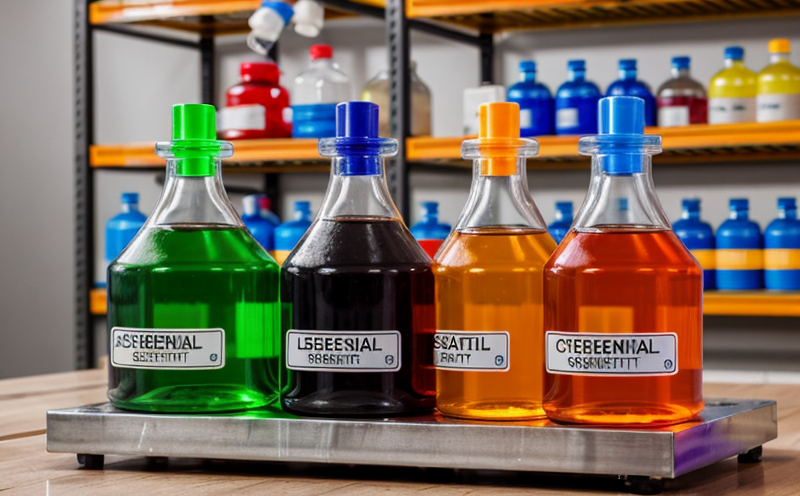Styrene Content Testing in Plastics
The testing of styrene content in plastics is a critical component within the broader realm of chemical safety and restricted substances testing. This service ensures that products containing plastic components are compliant with regulatory requirements and safe for consumer use.
In recent years, there has been increasing concern over the presence of harmful chemicals like styrene, which can leach from certain types of plastics into food or drink items during storage or usage. These concerns have led to stricter regulations worldwide, particularly in industries such as packaging, electronics, and automotive manufacturing.
Styrene content testing involves analyzing plastic materials to determine the presence and concentration levels of styrene monomer within the polymer matrix. This is achieved through various analytical methods, including gas chromatography (GC), Fourier transform infrared spectroscopy (FTIR), and nuclear magnetic resonance (NMR). Each method has its own advantages depending on factors such as sample complexity, precision requirements, and cost considerations.
One of the key challenges in conducting styrene content tests is ensuring accurate representation of actual product conditions. This requires careful preparation of test samples which may involve grinding, sieving, or dissolution steps tailored to the specific type of plastic being analyzed. Proper handling techniques are also crucial to avoid contamination that could skew results.
Once prepared, these samples undergo rigorous analysis using advanced analytical equipment capable of detecting even trace amounts of styrene down to parts per million (ppm) levels. Compliance with international standards such as ISO 16879:2013 or ASTM D5457-19 helps ensure consistency across different laboratories and regions.
Understanding the implications of styrene exposure is essential for both manufacturers and consumers alike. Exposure routes include inhalation, ingestion via food packaging materials, or direct contact through personal care products containing plastic components. By providing reliable data on styrene content in plastics, this testing service plays a vital role in safeguarding public health.
For instance, if a manufacturer discovers that their product contains excessive levels of styrene during routine quality control checks, they can take immediate corrective actions such as reformulating the formula to reduce styrene content or implementing additional processing steps designed specifically for reducing volatile organic compounds (VOCs).
The importance of accurate and consistent testing cannot be overstated. Inaccurate results could lead to false conclusions regarding product safety, potentially resulting in unnecessary recalls or costly redesign efforts. Conversely, overestimating the amount of styrene present might cause unwarranted alarm among consumers, leading to reduced sales.
To summarize, styrene content testing is an indispensable tool for ensuring chemical safety and compliance with restricted substances regulations across various sectors. By leveraging advanced analytical techniques and adhering strictly to recognized international standards, this service provides trustworthy insights into the presence of styrene in plastic materials.
Benefits
- Ensures compliance with regulatory requirements related to restricted substances like styrene.
- Promotes safer products by minimizing exposure risks associated with volatile organic compounds (VOCs).
- Aids in product development and formulation adjustments aimed at reducing harmful chemical content.
- Enhances brand reputation through transparent communication about the safety attributes of your products.
Why Choose This Test?
Selecting this testing service offers numerous advantages for businesses operating in diverse industries. Firstly, it enables companies to stay ahead of changing regulatory landscapes by identifying potential issues early on. Secondly, it provides peace of mind knowing that all products meet the highest standards of safety and reliability.
Additionally, choosing our styrene content testing service demonstrates a commitment to corporate social responsibility (CSR). It shows stakeholders that you prioritize environmental sustainability as well as consumer health and wellbeing.
Beyond mere compliance, this testing also supports continuous improvement initiatives. By regularly monitoring styrene levels in products throughout the supply chain, businesses can identify trends or anomalies that warrant further investigation. This proactive approach not only strengthens internal processes but also fosters trust with external partners and customers alike.
Quality and Reliability Assurance
- Accurate measurement of styrene content down to parts per million (ppm) levels.
- Adherence to international standards such as ISO 16879:2013 and ASTM D5457-19 for consistent results.
- State-of-the-art analytical equipment ensuring precise readings regardless of sample complexity.
- Detailed reporting formats tailored to meet specific client needs, including raw data and interpretative comments.





